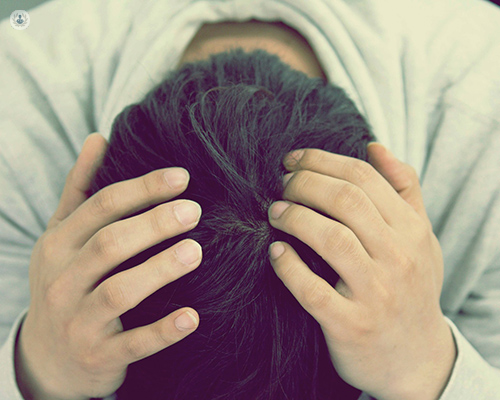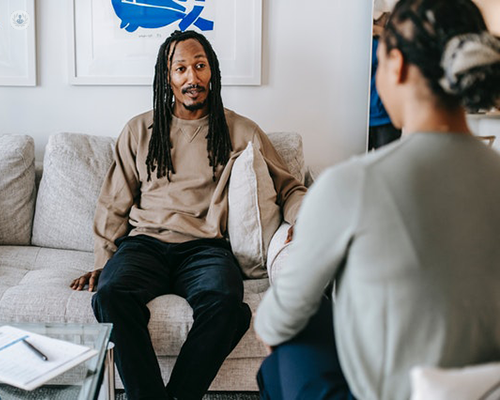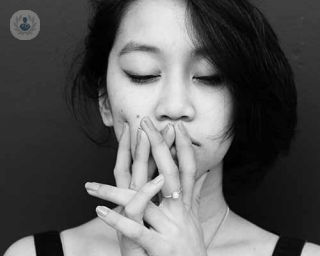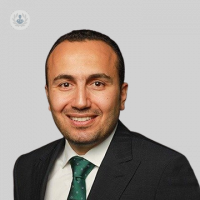Anxiety
Dr Leon Rozewicz - Psychiatry
Created on: 07-08-2013
Updated on: 04-10-2024
Edited by: Sophie Kennedy
How is anxiety defined?
Anxiety disorder differs from simply feeling anxious, which is a normal response to a stressful situation, like making an important decision, or taking an exam. When anxiety becomes a medical problem, known as anxiety disorder, it can affect people at any time, causing constant fear and worry, often for intangible reasons, and can often make it difficult to carry on with normal life.

What are the symptoms of anxiety disorder?
Anxiety can affect people in a number of different ways, giving both physical and psychological symptoms. Common psychological symptoms caused by anxiety include:
- restlessness
- irritability
- difficulty concentrating
- feeling ‘on edge’
People suffering with anxiety often experience physical symptoms such as:
- panic attack
- tiredness
- dizziness
- heart palpitations or rapid heart rate (tachycardia)
- tension and aching muscles
- headache
- difficulty sleeping
- stomach ache
- difficulty breathing or shortness of breath
- feeling nauseous or vomiting
- stomach and digestive issues
- lowered functionality of the immune system, which can result in frequent viral infections and being generally vulnerable to illness
- memory loss
- weight gain
What causes anxiety?
Often the cause of anxiety is something you know about, such as a stressful situation, issues at work, relationship problems, or family conflict. It can also be related to a known phobia, such as a fear of heights will cause you to feel anxious when near a ledge.
With anxiety disorder, the source of the anxiety is not always clear. You may not know why you feel anxious, or what is triggering the feelings. In these cases, it is difficult to know how to solve the anxiety without knowing what the triggers are.
What can trigger anxiety?
Individuals experiencing symptoms of anxiety may have their symptoms worsened by certain triggers. Common triggers of anxiety include:
- excessive consumption of caffeine
- a disorganised home environment
- lack of good quality sleep
- stress
- financial concerns
- some social situations
- conflict or relationship problems
- health issues, such as a chronic illness or an acute medical problem
- some medications
- poor diet
- consumption of drugs or alcohol
- changes in routine
- bereavement
- pregnancy or becoming a parent
Although many of these factors can commonly trigger symptoms of anxiety, this varies according to the individual. Establishing which triggers are relevant to your own experiences with anxiety can be key in resolving and managing the condition going forward.
Is anxiety serious?
Anxiety can seriously impact a person’s mental and general wellbeing if it affects their ability to partake in activities within their usual routine, including both personally and professionally. If it is not managed effectively, anxiety can lead to further mental health problems, such as depression or suicidal thoughts.
Long term anxiety which is not successfully treated can cause some physiological changes to occur in the body which can lead to serious complications, such as high blood pressure. In extreme cases, anxiety-related tachycardia can interfere with normal heart function which can have serious consequences.
How is anxiety diagnosed?
When you see an anxiety specialist, you will be asked a series of questions to get to the root of the cause of the symptoms, and to differentiate it from other conditions such as depression. It may be difficult for you to talk about your feelings, and your doctor will help to put you at ease. You may also be required to carry out a physical examination and a blood test to rule out any other conditions that may be causing the symptoms.
Can anxiety cause complications if left untreated?
It is important to seek medical advice if you feel that symptoms of anxiety are impacting your quality of life or preventing you from engaging in daily activities. Living with unresolved anxiety can lead to mental health complications, including depression, substance misuse and social isolation problems as well as issues in maintaining work or family commitments.
It can also weaken the immune system over time as well as causing heart problems, such as high blood pressure which may lead to a weakening of the heart muscle or coronary disease.

Can anxiety be cured?
Anxiety can be considered to be an unavoidable aspect of life, meaning there is no way to cure or eliminate it definitively. However, serious anxiety or anxiety disorder that is debilitating and affects a person’s quality of life is very treatable and finding effective management strategies and being aware of individual triggers can be hugely beneficial for many people.
How is anxiety treated?
Once you have been diagnosed with anxiety, there are a number of ways that the doctor may try to treat the condition. One of the most common initial treatments offered is cognitive behavioural therapy (CBT), which helps you to understand your problems, and the triggers allowing you to control the condition better. CBT will involve a series of meetings with a specialist over a period of months that will help you to understand the source of the negative feelings.
Other methods of treatment include mindfulness training, which aims to make you more aware of your feelings, and when you are beginning to feel anxious, once you have achieved this understanding, controlling the feelings can become easier, and you will learn methods of allowing yourself to calm down in a situation where the anxious feelings are beginning to rise.
Finally, medication may be the preferred method of treatment if the other options haven’t been successful. There are a number of medications that your doctor can prescribe that may help with anxiety, and your doctor will decide on the best course for you.
What lifestyle changes can help to control anxiety?
There are a number of lifestyle measures which can be of benefit for patients suffering from anxiety, such as:
- increased physical activity
- maintain good sleep habits
- a healthy and balanced diet
- maintaining social contact with people you feel comfortable around and can talk to
- limiting use of social media and screen time
- avoiding consumption of alcohol or drugs
- practising meditation or mindful activities
- maintaining a clean and organised home environment
- journaling to identify stressors and triggers
- lowering caffeine consumption
Although many people experiencing symptoms of anxiety may benefit from implanting some of these lifestyle measures, it is important for patients to identify sources of anxiety as well as factors which have a positive impact upon them which are relevant to them individually.
What type of doctor treats anxiety?
Specialist psychiatrists treat anxiety.
















